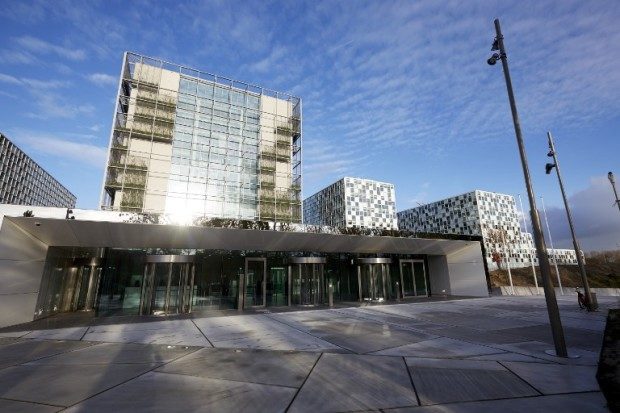‘Duterte won’t save himself from ICC probe’ – Tinio

FILE – This file photo taken on November 23, 2015 shows the building of the International Criminal Court (ICC) in The Hague, The Netherlands. AFP PHOTO / ANP / Martijn Beekman
President Rodrigo Duterte “won’t save himself” from the investigation of the International Criminal Court (ICC) even after he declared the Philippine’s withdrawal from the Rome Statute, progressive lawmakers said Wednesday.
ACT Teachers Rep. Antonio Tinio said Duterte’s withdrawal from the Rome Statute, the treaty that established the ICC, was “utterly self-serving and driven by sheer panic at the prospect of a trial before the ICC for crimes against humanity related to his murderous war on drugs.”
“However, President Duterte won’t save himself from ICC investigation by withdrawing the Philippines as a State Party to the Rome Statute,” Tinio added.
The lawmaker cited Article 127 of the Rome Statute which states that the withdrawal “shall come into effect one year after receipt of notice.” It further provides that “a State shall not be discharged, by reason of its withdrawal, from the obligations arising from this Statute while it was a Party to the Statute, including any financial obligations which may have accrued.”
Tinio said the Statute also stated that the withdrawal would not affect any cooperation with the Court in connection with criminal investigations and proceedings, and the withdrawing State’s duty to cooperate in the said investigations which were commenced prior to the date on which the withdrawal became effective.
“In short, since the ICC has already commenced with proceedings regarding Pres. Duterte’s war on drugs, it has the authority to proceed and the Philippine government has the obligation to cooperate with an investigation, regardless of the notice of withdrawal,” Tinio explained.
“Whether he likes it or not, he will be held accountable,” he added.
Bayan Muna Rep. Carlos Isagani Zarate likewise slammed Duterte’s withdrawal from the treaty as “ominous” and a “grave setback to human rights and accountability.”
“Pres. Duterte’s withdrawal from the Rome statute is intended to escape accountability by present and even future officials for crimes committed against the people and humanity. This is ominous of an even worse human rights situation in the country,” he said.
“For all the bluster of the present administration in the manner it launched its bloody wars, this withdrawal also means that it is gravely petrified of the long arm of the law and accountability,” he added.
Duterte justifies withdrawal from treaty
Earlier, Duterte announced the country’s withdrawal from the treaty as there appeared to be a “concerted effort” between the United Nations special rapporteurs and the ICC special prosecutor to paint him as a “ruthless and heartless violator of human rights who allegedly caused thousands of extrajudicial killings.”
READ: Duterte does the inevitable, withdraws PH from ICC treaty
In February, the ICC launched a preliminary examination into Duterte’s bloody war on drugs, which was criticized to have killed thousands of suspected drug criminals and have stemmed to alleged extrajudicial killings.
The President, who is accused of stoking the killings with inflammatory statements, has taken issue over the Philippines becoming the first southeast Asian nation put under a preliminary examination by the ICC prosecutor.
Opened in 2002, the ICC is the world’s only permanent war crimes court and aims to prosecute the worst abuses when national courts are unable or unwilling.
The Philippines, under previous President Benigno Aquino, ratified in 2011 the Rome Statute which underpins the ICC, giving the tribunal authority to investigate crimes on its soil.
On Wednesday Duterte, a former lawyer, attacked the ICC’s preliminary examination into his anti-narcotics campaign saying it was “unduly and maliciously created.”
“It is apparent that the ICC is being utilized as a political tool against the Philippines,” he said.
In his statement, Duterte cited “baseless, unprecedented and outrageous attacks on his person as well my administration.”
“The acts allegedly committed by me are neither genocide nor war crimes. The deaths occurring in the process of legitimate police operations lacked the intent to kill,” he added.
But even as early as October 13, 2016, when Duterte had only been in office less than four months, the ICC prosecutor Fatou Bensouda said in a statement that she was “deeply concerned” over reports of extra-judicial killings of over 3,000 alleged drug users and pushers.
Philippine officials had initially said in February that the country was ready to cooperate but asked for fairness.
Duterte’s spokesman Harry Roque also said they would refuse a visit by one such rapporteur Agnes Callamard, who had previously been pressing to investigate the killings.
But Roque has also said the ICC has no jurisdiction over the case because the tribunal was intended as a “court of last resort” and the Philippine courts were fully functioning. With a report from Agence France Presse/ac